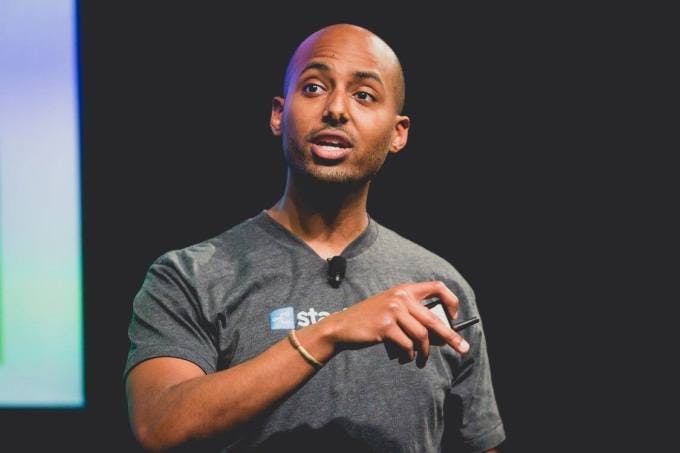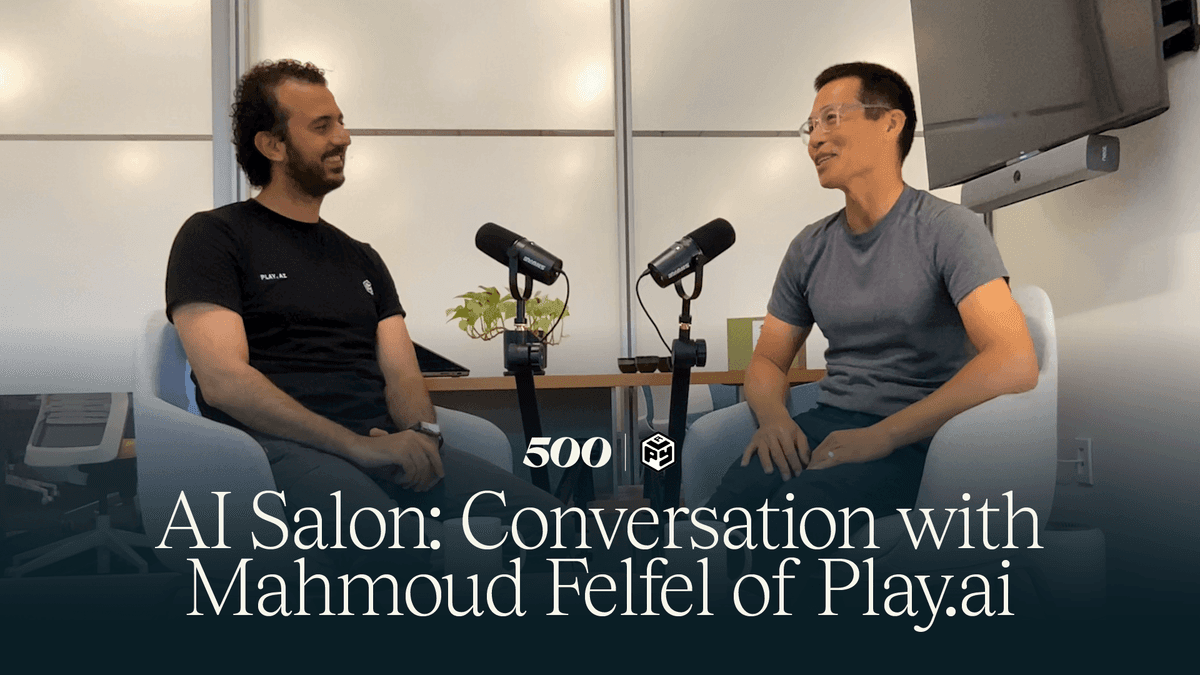4 key pieces of advice from a Batch 15 founder.
2020.11.04

500 Global Team

When Stackshare founder Yonas Beshawred first graduated from college, he joined one of the world’s largest consulting firms, Accenture, and quickly discovered the surprising way Fortune 500 companies were making tech decisions at-scale. They’d enlist large research firms that issued high-level PDF reports covering all the potential technologies you could choose from before making a selection. “It was sort of an odd way to make technology decisions, but that was just the industry standard,” Beshawred recalls.
Silicon Valley wasn’t playing the comparison game much better. When he joined a Bay Area startup, Cube, in 2012, Beshawred saw the founders go back and forth with other tech execs about whether Heroku, AWS, or Azure was best cloud computing software, for instance. He called the process “really messy,” but it was also the birth of an idea: StackShare, a social network-like platform that allowed developers and companies to rank open source, SaaS technology and developer tools.
What began as a side project quickly grew into a company entering Batch 15 of 500 Startups flagship accelerator in 2015, before eventually becoming the go-to place to debate technologies in 2020. The StackShare platform now boasts 500,000 developers and CTOs, and has been recognized by Forbes as a Cloud 100 Rising Star.
What’s even more remarkable is that at the time he started to work on his company, he didn’t even know how to code. Here’s how he did it.
Network, network, network
“Some of the hardest challenges were early,” says Beshawred. “Like, how do I even build the product?” He was just learning to code and didn’t have a technical co-founder to help. So, he networked, meeting as many people as he could in the field, putting “the product out there on the internet” as much as could, particularly on Hacker News. Eventually, someone saw the concept for StackShare online and introduced him to Nick Grandy, who was employee #1 at Airbnb. “He took a liking to what I was doing, made the first version of the app, and became our first investor,” says Beshawred. “That first challenge, getting to him, took a long time.”
He’s still a huge proponent of networking your way to success, even if it’s mostly digital. “Many times, I’ve reached out to someone and they’ve reached back,” he said. Shoot your shot.
Focus on traction
Beshawred felt like an outsider when he started to raise for the first time, being a Black founder from the East Coast without a tech background or an Ivy League pedigree.. He made sure to prepare and over-perform in generating traction, metrics, traffic and users for investors to analyze. “I truly believed that if my business was compelling, and I had traction, then they would invest, so I kept telling myself, ‘Traction trumps all,’” Beshawred says. “You could have all the different biases in the world, but at the end of the day, investors want to make money. If you can show them how that’s going to happen, and that you’re unstoppable, then you can get all the investors you want.”
Beshawred says Jocelyn Goldfein was “a critical early investor.” As an angel, she led StackShare’s syndicate on AngeList, and introduced the company to a firm that led its seed round, Cervin Ventures. “With Jocelyn, it felt like a match made in heaven,” says Beshawred. She had worked as an engineering director at VMware, and then later on Facebook, so she had the perfect mix of being technical herself, and then having enterprise/SaaS and social networking experience.”
The 500 Startups accelerator program also helped prepare him for fundraising, though Demo Day was around Halloween 2015 and he ended up waiting until after the new year to really kick it into high gear. The graph looked good!” he recalls.
Engage with investors in an intuitive way
In his earliest days of fundraising, Beshawred read a lot about how to pitch angels and VCs. “I tried to follow some of the advice I found online, which was like, ‘If you have one meeting, by the second you should close them,’” he recalls. “There were all sorts of weird best-practices for closing investors. I tried it all, and none of it worked for me.” Eventually, he ended up taking a more intuitive approach, and doing what a situation called for.
He remembers a compelling piece of advice from a fellow 500 Startups founder, who had introduced him to an angel investor. He connected with the angel, they hit it off, and Beshawred remembers thinking he’d have a commitment fairly quickly; his friend advised him to just take his time and not try to arbitrarily box the process into two meetings, or even three. “When I did that, it ended up working out, and this person ended up being our biggest angel investor to date,” he says. “They ended up putting in $100K, because I spent time with them, met with them on their terms, helped them understand me and the business.” Beshawred says this was a huge lesson. “Some investors take longer than others, and you need to be open to working with them,” he says.
Find your mentors
Beshawred says mentor guidance has been critical to StackShare’s success. One of his mentors at 500 was Selcuk Atli, founder of Boostable and Bunch. “ “He taught me everything from how to fundraise, right down to how I should reply to this email. He’s been one of my main mentors through all these stages of the company.” He also points to Chris Morton, the former CEO of Cube, the first startup he worked at in Silicon Valley and a serial entrepreneur. “He took me under his wing, and made me realize I did want to go after this idea that might turn into a company eventually,” he says.
Creating a network of founders to really get in the weeds of startup issues is important, says Beshawred, especially coming from outside of the ecosystem. It makes you realize “everyone is just as clueless as you are when it comes to their own businesses,” he says. “Creating something new, from scratch, is just hard,” he says. “And sometimes you forget that, and you think that maybe it’s you; having mentors like Chris Morton and Selcuk Atli helped me through a lot of rough times, because they shared their own similar challenges, which let me know that they weren’t unique to me.
Especially early in StackShare’s history, Beshawred got a ton of useful advice from serial founders who had walked the path before. “I highly recommend everyone try to find a mentor who can tell you about their own experience, and just be a sounding board for you,” he says. Yonas himself has been a mentor for founders of color through his journey, most recently through a non-profit called Transparent Collective, which he encourages Black founders to apply to.
NOTE: JENNA BIRCH IS A GUEST POSTER AND ANY VIEWS OR OPINIONS REPRESENTED IN THE ABOVE POST ARE PERSONAL AND DO NOT REPRESENT THOSE OF 500 STARTUPS OR ANY OF ITS STAFF OR AFFILIATES UNLESS EXPLICITLY STATED. ALL CONTENT REPRESENTED ABOVE IS PROVIDED FOR INFORMATIONAL PURPOSES ONLY. 500 STARTUPS MAKES NO REPRESENTATIONS AS TO THE ACCURACY OR COMPLETENESS OF ANY INFORMATION CONTAINED IN THE ABOVE POST. NO LIABILITY CAN BE ACCEPTED FOR ANY ERROR OR OMISSIONS. UNDER NO CIRCUMSTANCES SHOULD ANY OF THE ABOVE CONTENT BE CONSTRUED AS LEGAL, TAX OR INVESTMENT ADVICE FROM 500 STARTUPS OR ANY OF ITS AFFILIATES. 500 STARTUPS DOES NOT GUARANTEE ANY FUTURE RESULTS FOR ANY DECISIONS MADE BASED IN WHOLE OR IN PART ON THE CONTENT OR INFORMATION CONTAINED IN THIS POST.
UNDER NO CIRCUMSTANCES SHOULD ANY INFORMATION OR CONTENT IN THIS POST, BE CONSIDERED AS AN OFFER TO SELL OR SOLICITATION OF INTEREST TO PURCHASE ANY SECURITIES ADVISED BY 500 STARTUPS OR ANY OF ITS AFFILIATES OR REPRESENTATIVES. UNDER NO CIRCUMSTANCES SHOULD ANYTHING HEREIN BE CONSTRUED AS FUND MARKETING MATERIALS BY PROSPECTIVE INVESTORS CONSIDERING AN INVESTMENT INTO ANY 500 STARTUPS INVESTMENT FUND.






